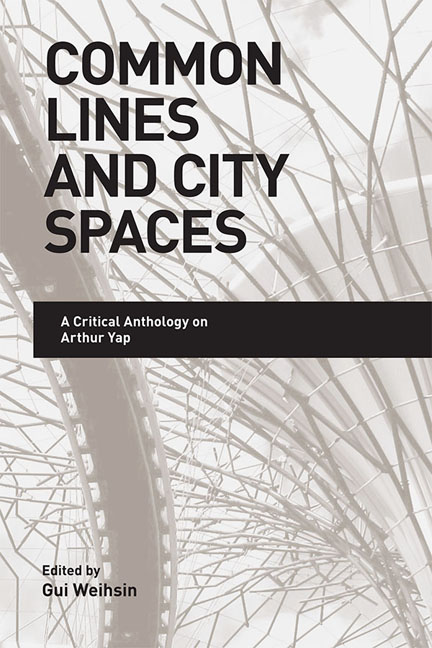Book contents
- Frontmatter
- Contents
- Acknowledgements
- About the Contributors
- 1 Common Lines and City Spaces: Introduction
- 2 The Transformation of Objects into Things in Arthur Yap's Poetry
- 3 “the same tableau, intrinsically still”: Arthur Yap, Poet-Painter
- 4 “go to bedok, you bodoh”: Arthur Yap's Mapping of Singaporean Space
- 5 On Places and Spaces: The Possibilities of Teaching Arthur Yap
- 6 Arthur Yap's Ecological Poetics of the Daily
- 7 “except for a word”: Arthur Yap's Unspoken Homoeroticism
- 8 “a long way from what?”: Folkways and Social Commentary in Arthur Yap's Short Stories
- Index
- Plate section
1 - Common Lines and City Spaces: Introduction
Published online by Cambridge University Press: 19 May 2017
- Frontmatter
- Contents
- Acknowledgements
- About the Contributors
- 1 Common Lines and City Spaces: Introduction
- 2 The Transformation of Objects into Things in Arthur Yap's Poetry
- 3 “the same tableau, intrinsically still”: Arthur Yap, Poet-Painter
- 4 “go to bedok, you bodoh”: Arthur Yap's Mapping of Singaporean Space
- 5 On Places and Spaces: The Possibilities of Teaching Arthur Yap
- 6 Arthur Yap's Ecological Poetics of the Daily
- 7 “except for a word”: Arthur Yap's Unspoken Homoeroticism
- 8 “a long way from what?”: Folkways and Social Commentary in Arthur Yap's Short Stories
- Index
- Plate section
Summary
Chances are if you are reading this book, you have already been introduced to Arthur Yap and his work through one of the numerous anthologies of Singaporean poetry and writing, or by way of several critical sourcebooks on Southeast Asian or Singaporean literature in English. Yap's consistent presence in these anthologies and collections suggests that he is an important and influential figure in both national as well as regional Englishlanguage literary landscapes, and it is regrettable that, unlike some of his contemporaries, no one volume was dedicated to his multifaceted creative output during his lifetime. The present collection of essays addresses this critical lack by gathering new and innovative work on Yap's prose, poetry, and painting written by an international group of scholars and critics. This introduction briefly summarizes the critical reception of his work and then discusses it in terms of three discursive modes of analysis, or literary and textual methods of examining our lived experience and living environment, both in specific terms of Singapore's history, society, and culture and in more general terms of modern life's concerns and predicaments. Some of our contributors examine, with renewed emphasis, important topics in Arthur Yap's writing that have been the subject of earlier critical essays, such as his erudite wordplay and laconic voice, his apparently reserved and ambivalent attitude towards social and national issues, and his thoughtful treatment of urban space and the cityscape of modern Singapore. In addition, this collection also includes essays that shed new light on Yap's literary transformation of mundane objects into multifaceted things; the connection between his verse and the natural environment as a nascent form of ecopoetry; the powerful stillness and silence in his paintings that resonate with his laconic poetic persona; the desire and affection expressed in his mapping of the queer spaces of the city and in the sheer sensuousness of his travel poems; and the social and cultural commentary of his short stories, which have never before been critically examined. It is hoped that the essays included here will pave new ground for future scholarship on Yap's work in different genres and media, such as his paintings and their exhibition at international venues, his rare but dazzling pieces of short fiction, as well as his own linguistic and literary criticism.
- Type
- Chapter
- Information
- Common Lines and City SpacesA Critical Anthology on Arthur Yap, pp. 1 - 13Publisher: ISEAS–Yusof Ishak InstitutePrint publication year: 2014



